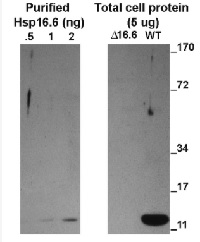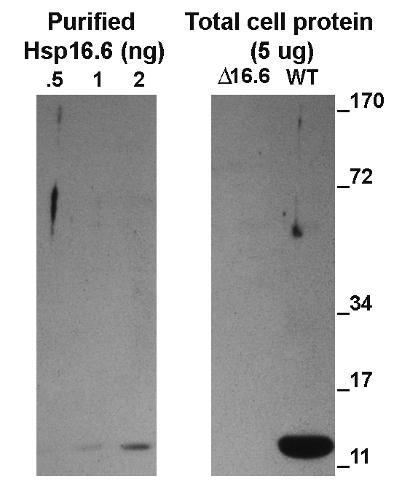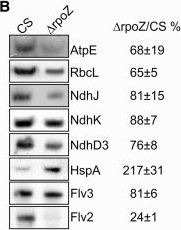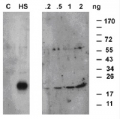1

Anti-HSP16,6 | Class I heat shock protein 16,6 (cytosolic)
AS08 286 | Clonality: Polyclonal | Host: Rabbit | Reactivity: Synechocystis sp. PCC 6803
- Product Info
-
Immunogen: Recombinant protein. Synechocystis PCC 6803 Hsp16.6 CI (class one) UniProt: P72977
Host: Rabbit Clonality: Polyclonal Purity: Serum Format: Lyophilized Quantity: 50 µl Reconstitution: For reconstitution add 100 µl of sterile water Storage: Store lyophilized/reconstituted at -20°C; once reconstituted make aliquots to avoid repeated freeze-thaw cycles. Please remember to spin the tubes briefly prior to opening them to avoid any losses that might occur from material adhering to the cap or sides of the tube. Tested applications: Western blot (WB) Recommended dilution: 1 : 5000 (WB) Expected | apparent MW: 16.6 kDa - Reactivity
-
Confirmed reactivity: Synechocystis sp. PCC 6803 Predicted reactivity: Synechococcus sp., Thermosynechococcus sp.
Species of your interest not listed? Contact usNot reactive in: No confirmed exceptions from predicted reactivity are currently known - Application Examples
-
Application example

Left panel: purified recombinant Hsp16.6 in 0.5, 1 and 2 ng per well. Right panel: 5 µg of total protein from Synechocystis PCC 6803 null mutant and WT were separated on 9-17 % SDS-PAGE and blotted 1h to nitrocellulose (Biorad). Blots were incubated in the primary antibody at a dilution of 1: 5 000 for 1h at room temperature with agitation and a secondary HRP-conjugated antibody (1: 10 000).
Application examples: 
Reactant: Synechocystis
Application: Western Blotting
Pudmed ID: 24476911
Journal: Nucleic Acids Res
Figure Number: 3B
Published Date: 2014-04-01
First Author: Gunnelius, L., Hakkila, K., et al.
Impact Factor: 16.476
Open PublicationUpregulated and downregulated genes in ?rpoZ. (A) The 187 genes upregulated at least 2-fold, and the 212 genes downregulated to one half or less were arranged to gene categories according to Cyanobase. (B) Total proteins were isolated and the amounts of AtpE, RbcL, NdhJ, NdhK, NdhD3, HspA, Flv3 and Flv2 proteins were detected by western blotting.
- Additional Information
-
Additional information: This product can be sold containing proclin if requested
Additional information (application): On a gradient gel Hsp16.6 runs closer to 11 kDa - Background
-
Background: Hsp16.6 belongs to a family of class I of a small heat shock proteins. They are induced once a cell is stressed by an increased temperature. Synechocystis Hsp16.6 is involved in the development of thermotolerance and thylakoid stability. The way small hsp proteins are protecting a living cell are not fully understood. They seem to be involved in chaperone functions by protecting other proteins from irreversible denaturation.
- Product Citations
-
Selected references: Gunnelius et al. (2014). The omega subunit of the RNA polymerase core directs transcription efficiency in cyanobacteria. Nucleic Acids Res. 2014 Jan 29. - Protocols
-
Agrisera Western Blot protocol and video tutorials
Protocols to work with plant and algal protein extracts - Reviews:
-
This product doesn't have any reviews.
Accessories

AS07 254 | Clonality: Polyclonal | Host: Rabbit | Reactivity: A. thaliana, A. tequilana, B. juncea, Citrus sp., C. sativus, I. pumilla (perennial monocot), P. ternata, P. sylvestris, S. vulgaris, V. faba


